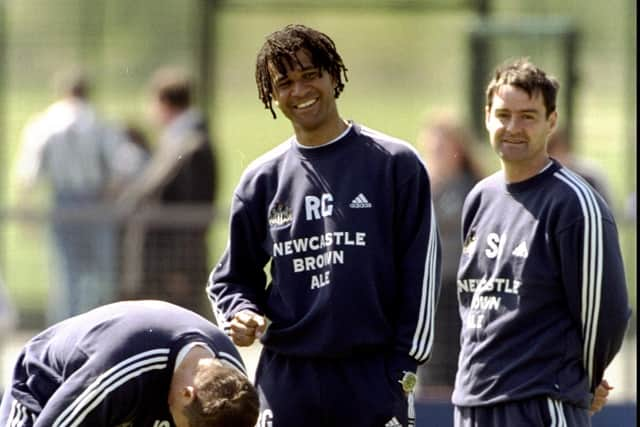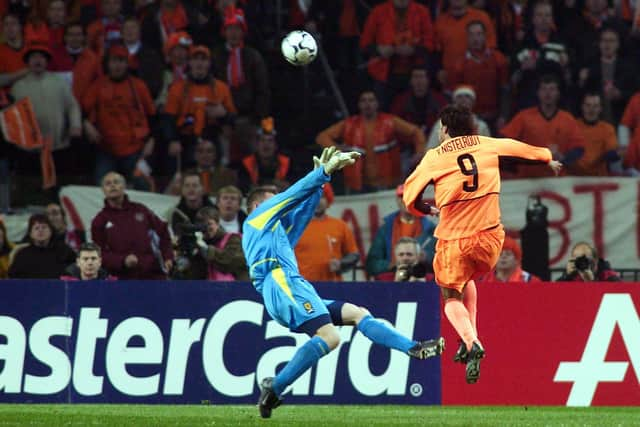Steve Clarke given reason to reminisce and hope for meeting with Dutchman who set him off on Scotland road
Scotland won’t try to reinvent the wheel in this last international window before Euro 2024 and maybe that’s a good thing given the outcome of their last two trips to Amsterdam, where Steve Clarke’s side face the Netherlands in what the manager described as a “competitive friendly” this evening.
Nine goals conceded, none scored. Clarke’s own personal history with the Dutch pre-dates these meetings and produced little more good cheer, whether in a St Mirren or Scotland shirt.
Advertisement
Hide AdAdvertisement
Hide AdFortunately for him he kept a safe distance in November 2003. Although known as the Amsterdam Arena rather than the Johan Cruyff Stadium, the Dutch football HQ’s current name, the great man himself could have been playing for Oranje as Berti Vogts’ side reaped the whirlwind following a memorable, if ultimately worthless, 1-0 first leg victory in the Euro 2004 play-off. It was 4-0 after 50 minutes, 6-0 with still more than 20 minutes left to play.


The 3-0 defeat in 2009 is perhaps better remembered as the prelude to Boozegate, an epic post-game drowning-of-sorrows sessions that cost Barry Ferguson his Scotland career and severely interrupted Allan McGregor’s. It also fatally undermined then manager George Burley’s authority.
Any drinking on Clarke’s watch has been done with his expressed permission and with him in attendance – to wit the impromptu night out in Glasgow in October after Spain obtained the result required against Norway to send both them and Scotland to Germany for this summer's finals.
Tonight's game is an important staging post en route to the finals as well as a handy reference point for Clarke to reflect on his own personal association with the Dutch, against whom he won the last of six international caps 30 years ago this May. The surprise call-up from Craig Brown was a belated return to the international fold six years on from his previous cap. Sadly, the game stands as a full stop in a Scotland playing career that, in direct contrast to this on-going managerial chapter, might be regarded as unfulfilled. It plainly failed to provide the desired kick-start for Clarke when it came to playing for his country. “We got humped!” he recalled last night, on his return to the Netherlands. “It was (only) 3-1, but we got humped. They were going to the World Cup and we were sort of cannon fodder for their send off.”
Clarke was a victim of the eagerness to impress although he wasn’t the only one who played his last game for his country that night. No bigger name than Ruud Gullit made his 66th and final appearance that same evening in Utrecht, abruptly calling an end to his international career shortly afterwards and before Dick Advocaat’s squad set off for the World Cup in the United States. After appearing to have patched up his differences with Advocaat, the player realised this peace pact could not be sustained. He walked away from the national team.


It was not the first or last time Clarke and Gullit’s worlds collided. Their first meeting was in Paisley of all places in a Uefa Cup first round tie between St Mirren and Feyenoord in 1983. Gullit had just turned 21, Clarke was even younger and making his way as a talented full-back. On top of being confronted by Gullit he had the veteran Cruyff, in his last match on Scottish soil, to contend with too. “He (Gullit) played right wing in the first game and was outstanding,” he remembered. “Then we went to Feyenoord and he played sweeper – and he was even better.”
Who could have predicted the impact Gullit would go on to have in Clarke’s career – and, indeed, life? He uprooted his family from London to the north-east of England to join Gullit at Newcastle. The Dutchman is a huge reason – indeed, perhaps the primary reason – why Clarke was standing in the bowels of a stadium speaking to a gaggle of Scottish journalists in Amsterdam yesterday. “I must have made some kind of impression on him!” he said. “When he got the job at Newcastle he phoned me up and asked me to come. He must have got a decent feel for me.”
The pair had been teammates at Chelsea initially. “He became player manager after Glenn Hoddle took the England job, so he was a teammate as well as the gaffer, so that was interesting,” explained Clarke. “Obviously we won the FA Cup with Ruud as manager, which was nice.”
Advertisement
Hide AdAdvertisement
Hide AdTheir time together at Newcastle was brief. Gullit effectively ended Clarke’s playing career when he recruited him. “That was the start of my coaching," he said. "I was player-coach at Chelsea and one of the stipulations of the move was I could go to Newcastle as a coach, but not a player. It was fine. I’d just turned 35 and had some injury issues and was thinking it was probably time for a different career. Ruud gave me the first step – and I am grateful for it.”
Their working relationship ceased when Gullit was sacked after he fell out with Alan Shearer. He left both the England striker and Duncan Ferguson out of a derby against Sunderland, which was duly lost. “That’s not a team sheet, it’s a suicide note,” one journalist is said to have remarked.
Gullit was sacked after the game. Clarke stayed on and worked with Bobby Robson, Gullit’s popular replacement. Is he still in touch with his old Dutch pal? “I haven’t spoken to Ruud for a little while now,” he said. “It’s just … circumstances. Hopefully he comes to the game and I bump into him. It would be nice to see him.”
It would also be apt given the influential part Gullit has played in Clarke's life. And his potential attendance might be another reason why the Scotland manager, who promised to play his strongest side rather than opt to experiment, is so desperate to halt a current run of five games without a victory. There would be few better places to do so.